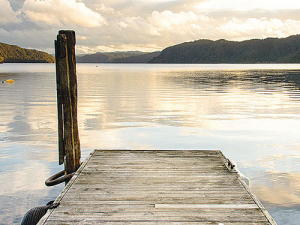Battle for milk
OPINION: Fonterra may be on the verge of selling its consumer business in New Zealand, but the co-operative is not keen on giving any ground to its competitors in the country.
 Chris Sutton says local farmers have worked together since the early 2000s to lead in protecting local lakes.
Chris Sutton says local farmers have worked together since the early 2000s to lead in protecting local lakes.
Fonterra is backing a farmer-led project to protect water quality in Bay of Plenty lakes.
Farmers from the Rerewhakaaitu community haved worked with Bay of Plenty Regional Council, Fonterra, Beef + Lamb New Zealand, AgFirst and PerrinAg to develop a farm-specific nutrient profile and produce 48 tailored farm environment plans (FEP).
The FEPs will help farmers minimise nitrogen and phosphorus losses to waterways.
This 18-month project involved farmers in the catchments of Lakes Rotomahana, Okareka, Okaro, Rotokakahi, Rerewhakaaitu and Tarawera, plus some adjoining farms in the Rangitaiki and Waikato River catchments.
Project Rerewhakaaitu is the farmer group at the centre of the project.
Andrew Kempson from Fonterra’s sustainable dairying programme, says they were keen to trial their new farm plan system — Tiaki — in a region with no onfarm nutrient limits to help farmers stay ahead of the game voluntarily.
“Tiaki farm plans also consider sediment and bacterial losses and how to reduce them.
“Fonterra staff have worked with 32 dairy farmers, covering a bit over 5000 hectares. Collectively there were 1060 onfarm actions identified in the new Tiaki farm plans in the Tarawera lakes catchments. We were also able to compare nutrient losses between land use, soil types and the different catchments.”
Project Rerewhakaaitu chairman Chris Sutton says local farmers have worked together since the early 2000s to lead in protecting local lakes.
“This latest project helps us work alongside industry and the regional council so each farmer gets their own customised farm environment plan with an Overseer assessment of their ‘nutrient footprint’,” he says.
“We know nutrient rules might affect our farmers one day, so it’s best we understand our footprint and have a set of actions farmers can implement on-farm. We also agreed to share nutrient loss data with the regional council.”
Keratin biomaterials company Keraplast and Wools of New Zealand have signed a new superpremium wool contract which is said to deliver a boost to wool growers.
While things are looking positive for the red meat sector in 2026, volatility in global trade remains a concern, says the Meat Industry Association (MIA).
The quest to find innovative practical, scientific solutions to deal with water-related issues at a catchment level has been the theme of an important conference at Massey University last week.
One of the country's top Māori farms faces a long and costly rebuild to get the property back to where it was before recent storms ripped through it.
The latest Global Dairy Trade auction results have delivered a boost to dairy farmers.
New Zealand potato growers are prioritising value creation from high yields to meet a complex mix of challenges and opportunities, says Potatoes NZ chief executive Kate Trufitt.
OPINION: Fonterra may be on the verge of selling its consumer business in New Zealand, but the co-operative is not…
OPINION: What does the birth rate in China have to do with stock trading? Just ask a2 Milk Company.